Staff Profile - The Medics
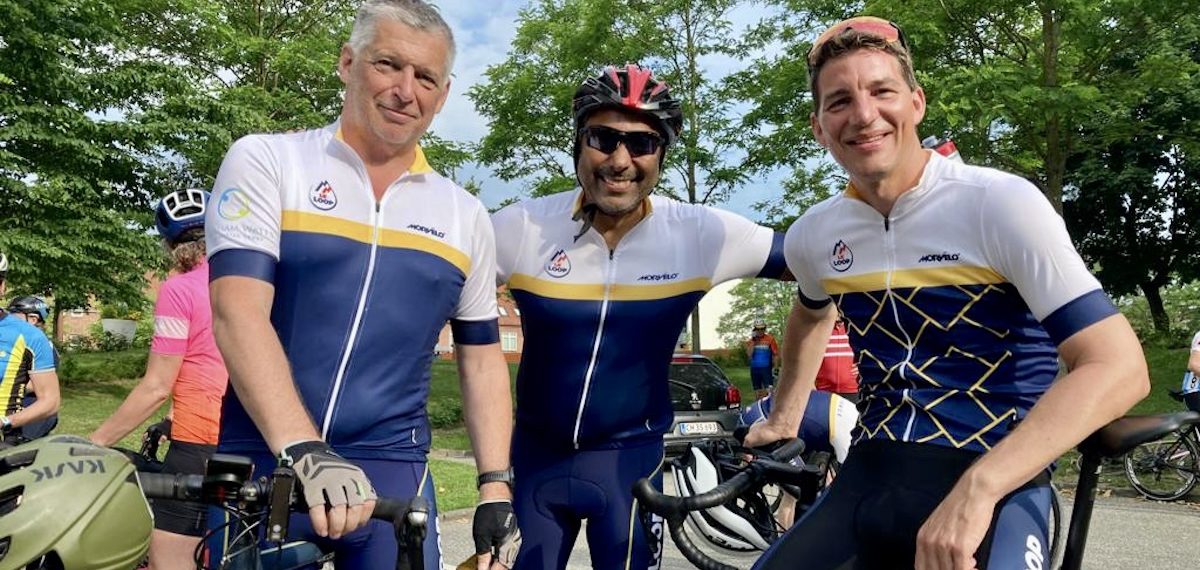
There are many unsung heroes of Le Loop, without whom we simply couldn’t make this event happen. Absolutely crucial on this list are our staff physio and massage therapists and our volunteer Tour Doctors.
We thought it would be fun to check in with a few of our medics to find out more … meet Dr Sarmid Al-Kamil, Dr Charlie Cox and physio Katy Nicoll. Dr Sarmid works as a GP while Dr Charlie’s day job is an intensive care registrar (having previously been an expedition medic). Katy is a Scottish physio based in Annecy.
NOTE: At the end of this blog we have the doctors’ advice for keeping safe and well on tour – an important read!
The Doctors
Our doctors all work on Le Loop as volunteers. Why? Yes, they all love to cycle of course (they ride along with you each day, one nearer the front, one towards the back) but they’re also all committed to the aims of the William Wates Memorial Trust and very very loyal to us. We owe them a lot and couldn’t run this event safely without them.
Before the tour, they’re checking your medical forms as they come in, flagging any potential concerns and chatting to riders in advance if necessary, so that they have a clear picture of the medical needs of our riders and plan accordingly. They also advise us on issues such as our covid policy and practices and put together our extensive medical kits.
Once on tour, the 2 doctors work with the rest of the Le Loop team to help keep everyone safe and pain free. They’re available at all times to step-up in an emergency, or to offer advice at feed stops. Once back at the hotel, while you’re all relaxing and maybe enjoying a drink, they’re giving up any recovery time to deal with medical issues that don’t fall under the remit of our physios and massage therapists. They work HARD.
The Massage Therapists/Physios
These miracle-workers are paid staff and are split between the day and evening shifts. There is a physio/mt in each of the feed stop vans, so if you need some emergency attention or advice out on the road, you can ask them for help at a feed stop.
Meanwhile, as you’re riding the route, the evening shift are heading directly to the finish hotel to get set up for everyone arriving at the end of the stage. They then provide therapy to every rider who needs it on a first come, first serve basis (you simply put your name down for the next available 10 minute slot). The day shift work alongside them until dinner so that we can help you all as quickly as possible, and the night shift then continues on until as late as necessary.
The team is absolutely committed to helping to keep you out on the road on your bike, and are known to work minor miracles! Plus the physio area is a fun place to hang out – there’s usually some cool tunes playing (they help to drown out the groans of agony!) and plenty of good banter. Time spent here is time well spent!
Q: So – how many tours have you ridden with us so far?
Dr Sarmid: I have ridden 2 tours with Le Loop so far: 2022, and 2023, this year will be my 3rd.
It is crazy, but I love it.
Dr Charlie: Like Sarmid, this will be my 3rd tour too, but they haven’t all been consecutive.
Physio Katy: I think this will be my 7th year, (with the obvious Covid break in the middle)
Q: You keep coming back – what is it that you enjoy about Le Loop, or perhaps your highlights?
Dr Sarmid: I love being part of an incredible team, that helps individuals fulfil their dreams of finishing a stage, or multiple stages or the entire route of the Tour De France. This is truly awesome.
And I really love witnessing the grit, the determination, the exhaustion and sometimes pain during the tougher sections, but also the joy, the accomplishment and the sense of achievement and overcoming difficulties, when the big climb is conquered, or the stage is finished.
Then thinking about the charity, and the Wates Family, who created from adversity a long-lasting legacy, creating an opportunity for many others to overcome possibly the biggest challenge of their lives.
Beside raising money for an excellent cause; it empowers the participants and the Le Loop team to believe that anything is possible.
Dr Charlie: There are so many things – the cycling of course, but also the teamwork amongst the staff, as well as the camaraderie with fellow riders on the road.
My medical highlight was probably patching up a rider last year with lots of stitches and then riding alongside him all afternoon to get him safely home.
And my non-medical highlight was probably coming down the Galibier in the dark with our lead cyclist Emily having stayed out with the last riders and being presented with the most delicious reward pizza by Sarah at the finish!
Physio Katy: The team and the event as a whole make me come back every year. Seeing how everyone works together cyclists alike, for a cause that helps so many young people, makes it an utterly unique experience, plus I think I’d get FOMO if I didn’t come back.
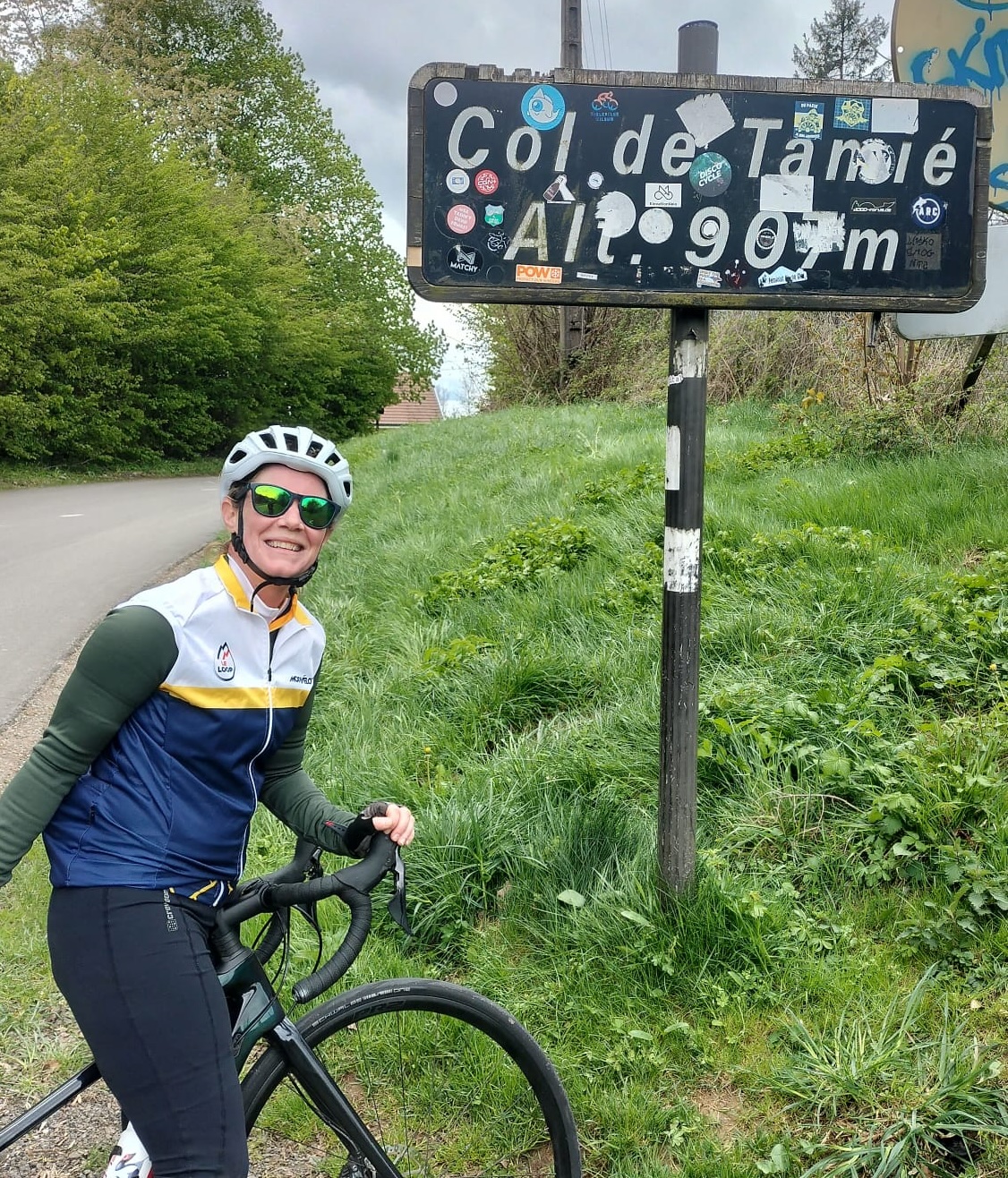
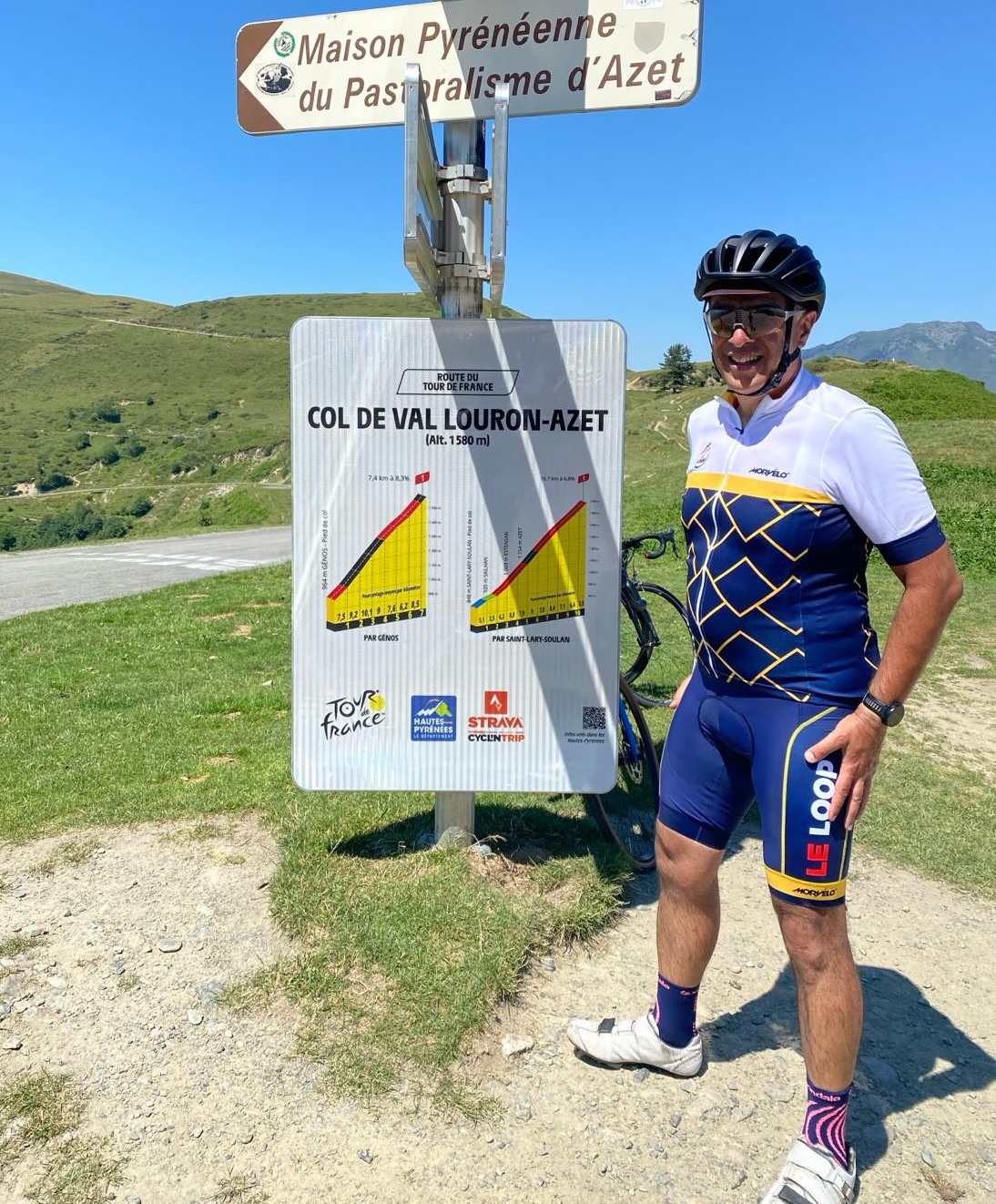
Q: In terms of medical help, what are the most common things you deal with?
Dr Sarmid: There are a few things that are pretty standard: pain of course, whether that’s through muscular aches, injuries or even saddle sores. We recommend all riders bring pain killers with them, but we also keep a good stock in our tour shop that riders can purchase if they need them.
Saddle sores can certainly bother some people (see below for advice on best-practices to minimise this problem! Ed) but extremes of heat or cold can cause all sorts of problems. Riding long days under a burning sun is as gruelling as descending from a col in a hail storm. Both extremes are possible: heat exhaustion as well as hypothermia.
Upset tummies can sometimes be an issue, whether that’s from poor water-bottle hygiene, or perhaps an over-consumption of carb drinks and gels. We’re really careful about hygiene on tour and have strict rules in place around feed stations – you’d be well advised to follow them!
Of course, people also arrive on tour with pre-existing ailments that can flare up during the ride, which is why those medical forms are so important – so that we have a clearer picture of what we’re dealing with.
Dr Charlie: People love coming to me with their groin photos! For saddle sores – remember, sudocrem is your friend!
Physio Katy: Mostly it’s tired muscles at the end of the stage. The odd tendon issue, upper back/neck stiffness and knee complaints crop up as the tour goes on.
Q: What about more serious situations?
Dr Sarmid: Obviously this is what everyone dreads. This is when we switch from a cyclist to fully focussed medic, tending to the patient on the roadside (or wherever we are) while pulling the rest of the team into action and involving emergency services if needed. Thankfully these situations are extremely rare.
Dr Charlie: Like I said, I’ve stitched riders up on the side of the road before now. Ideally that’s as serious as it ever gets, but we’re ready for every eventuality. We will always work with local emergency services in serious medical emergencies to get the necessary treatment as fast as possible to the patient.
Physio Katy: I think Heat related illness, such as heat exhaustion, when cyclists arrive at the end of the stage as they generally come past us first before the medics have arrived, so there have been a few bad cases which needed managing as quickly as possible.
Q: Any final thoughts or advice?
Dr Sarmid: Le Loop isn’t a race – it’s a beautiful ride to be savoured, and riding safely and within your limits is always the sensible thing to do. We want everyone to have a fantastic time, to be safe and well and head home even fitter and healthier than when they arrived!
NEVER try anything new when you get on Tour. Everything you wear, position of your saddle and cleats, medications you take, creams you use and hydration you drink should all be tried and tested. Changing something when you come is a recipe for disaster and a sure way to get an injury or become unwell.
Dr Charlie: My top tip – Look after the people around you and they will look after you too.
Oh yeah – and the hardest part is the guilt of having such a wonderful time while leaving the family at home!
Physio Katy: Get a massage if possible, at the end of the day, and if you’re no sure of it, ask the returning cyclists their opinion as they will probably tell you how much it helps. If you are short of time, use the foam roller that we have with us as well, plus do your stretches. And if you have time on your hands and fancy just hanging out by the massage area, there is generally a bit of random chat occurring and some good tunes to listen to, too.
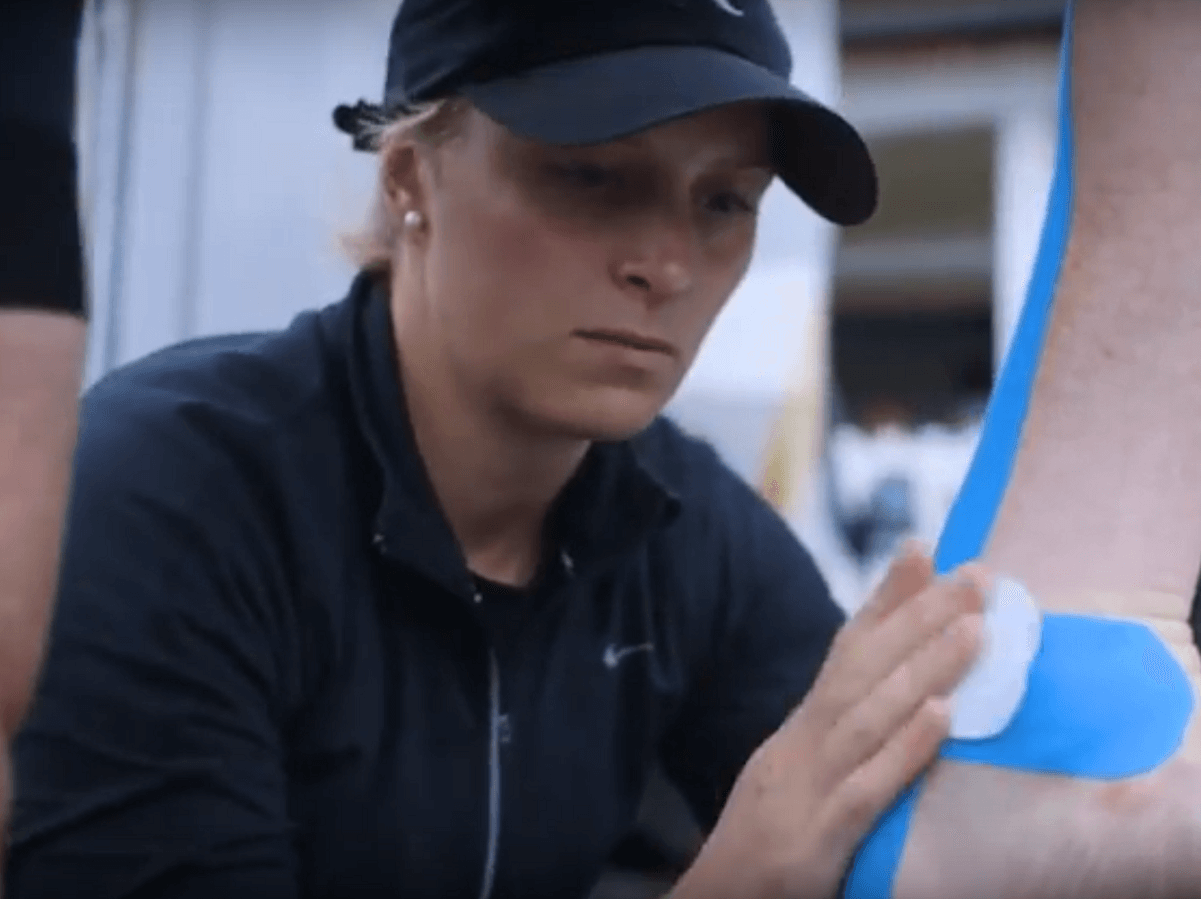
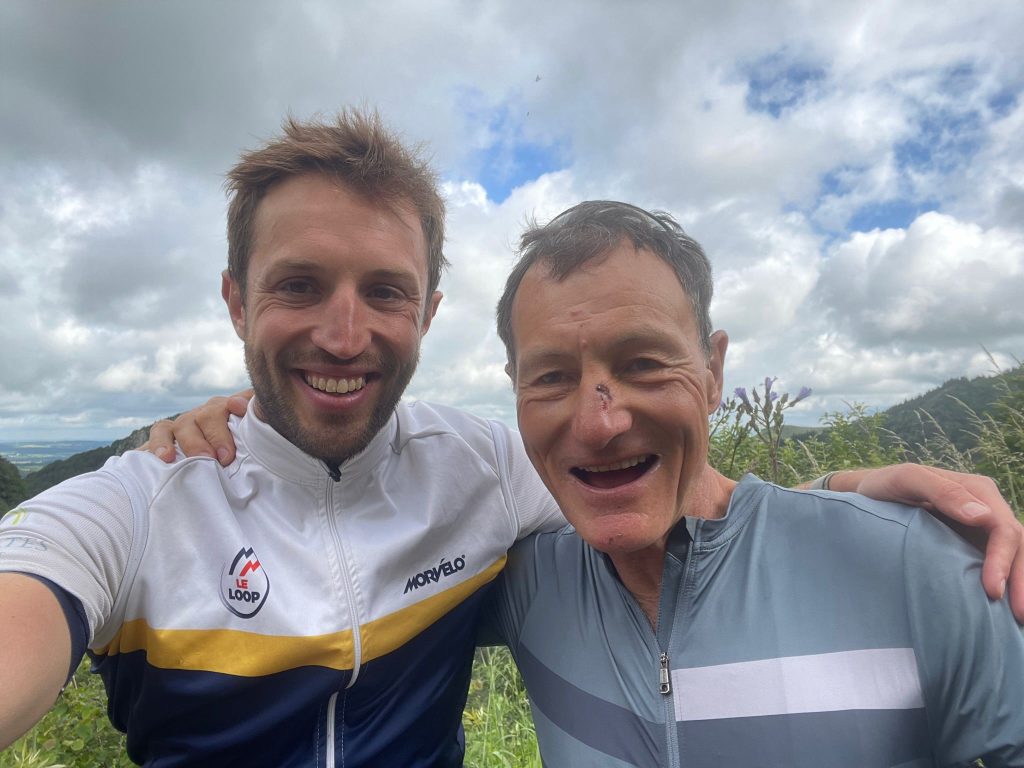
Indispensable advice from our Medics:
Our medics have put together the following advice for our riders. It’s WELL worth a read and has some important tips to help make sure that the only interactions you have on tour with our medics are fun ones!
Hydration
- Drink plenty of water, during and after the ride. Try to get 1 litre bottles instead of the standard size bottles, make sure they fit your bike frame. Ensure water bottles are cleaned every day and sterilised once a week using Milton tablets.
- Drink before you feel thirst. Take on extra fluids during hot days.
- Don’t experiment with new salt or electrolytes tablets during the tour.
💡Bring Milton tablets.
Fuelling and Nutrition
- Eat plenty before, during and after. Carbs, protein and everything you can digest.
- Average rider will burn 7000-9000 calories a day!!
- One of the limiting factors for endurance performance is the body ability to extract energy from food during multi day events.
- Eat more than you normally do!
- Don’t experiment during the tour with new supplements, proteins, recovery drinks etc.
Sleep
- Go to bed early, relax, and try to get as much night sleep as possible, this is essential for recovery.
- Rest days are for rest!
- Some riders mastered the art of having a snooze on bus transfers.
💡Bring ear plugs, eyes masks just in case you need them.
Alcohol
- Be extra sensible.
- Don’t drink while in charge of your bike!! This is a Le Loop rule – NOT mere advice.
- Be careful when you arrive at your destination; ensure you rehydrate with water or recovery product, try to eat with in the hour of completing the ride.
- Enjoy your achievement with fellow riders but don’t over-do it. Take extra care during hot weather or tough stages.
Personal hygiene
- One of the most common problems is saddle soreness and skin irritation.
- Ensure good fitting bib shorts, shower and change as soon as practical, wash them daily, rotate them if possible, use sudocrem if area is inflamed.
- Kit could rub in other places too. Ensure kit is well fitting and tried and tested.
💡Bring sudocrem.
Medications
- Make sure you bring your prescribed medications. Don’t exchange medications even if it is just skin creams, talk to one of the medics, we can help.
💡bring medications you are comfortable in using at home without medical advice eg paracetamol, loperamide, antihistamines, indigestion tabs etc
Heat and Sun exposure
- Be aware temperature could rise up to 40 during hot weather in July. Big exposed climbs on the hottest part of the day can be brutal.
- Hydration, sensible alcohol consumption in the previous days, light clothes, staying in the shade, deliberately slowing down your pace, cooling by wetting your cap or jersey, and these big water bottles are all required.
💡sun cream, light cycling kit, big water bottles.
Adverse weather
- Be prepared for anything, bring full winter kit. It can be really cold up the top of the mountains, even in July.
💡bring full winter kit.
Niggles, Aches and Pains
- During the tour, Le Loop provide medical and physio therapy support.
- If you start to experience niggles; Achilles, knees, lower back, neck problems talk to us early before the problem escalates.
💡access the medical and Physio team soon.
Head Injuries
- If you have had a fall off your bike and are showing signs of concussion, then our policy is that you do not ride for 24 hours, then you will be reassessed (a fall with significant helmet damage is to us a proxy for such a head injury).
Etiquette at Feed stations
- We will provide plenty of hand wash gels at feed stations. Please remember to take off your cycling gloves and wash your hands before approaching the feed station.
- Please remind your fellow cyclists to do so, we could all forget we we are tired or excited.
- Use provided utensil to pick food rather than your hands or own cutlery.
Face masks
- We will adhere to the National advice at the time of the event. Please bring a face mask and feel free to wear it if you wish.
💡bring a few face masks.

